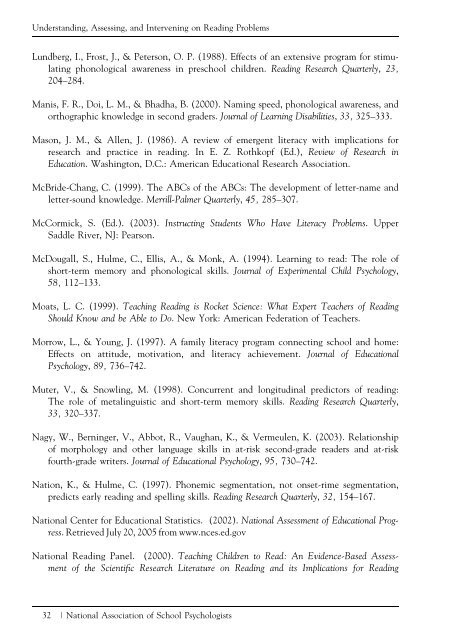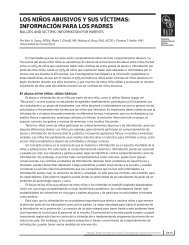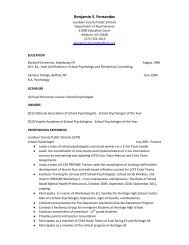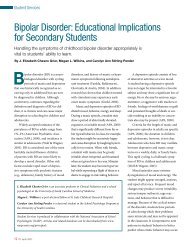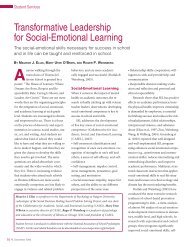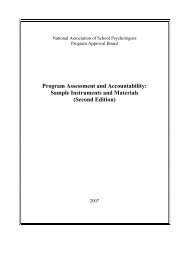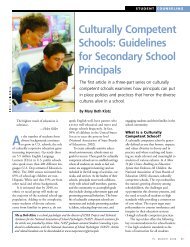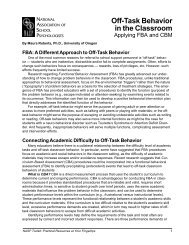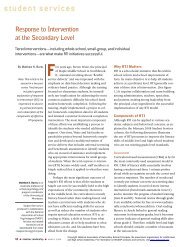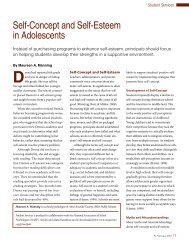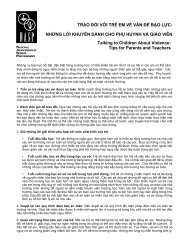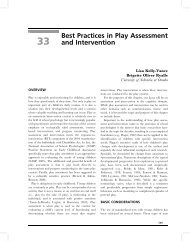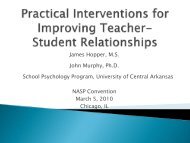Chapter 1 - National Association of School Psychologists
Chapter 1 - National Association of School Psychologists
Chapter 1 - National Association of School Psychologists
Create successful ePaper yourself
Turn your PDF publications into a flip-book with our unique Google optimized e-Paper software.
Understanding, Assessing, and Intervening on Reading Problems<br />
Lundberg, I., Frost, J., & Peterson, O. P. (1988). Effects <strong>of</strong> an extensive program for stimulating<br />
phonological awareness in preschool children. Reading Research Quarterly, 23,<br />
204–284.<br />
Manis, F. R., Doi, L. M., & Bhadha, B. (2000). Naming speed, phonological awareness, and<br />
orthographic knowledge in second graders. Journal <strong>of</strong> Learning Disabilities, 33, 325–333.<br />
Mason, J. M., & Allen, J. (1986). A review <strong>of</strong> emergent literacy with implications for<br />
research and practice in reading. In E. Z. Rothkopf (Ed.), Review <strong>of</strong> Research in<br />
Education. Washington, D.C.: American Educational Research <strong>Association</strong>.<br />
McBride-Chang, C. (1999). The ABCs <strong>of</strong> the ABCs: The development <strong>of</strong> letter-name and<br />
letter-sound knowledge. Merrill-Palmer Quarterly, 45, 285–307.<br />
McCormick, S. (Ed.). (2003). Instructing Students Who Have Literacy Problems. Upper<br />
Saddle River, NJ: Pearson.<br />
McDougall, S., Hulme, C., Ellis, A., & Monk, A. (1994). Learning to read: The role <strong>of</strong><br />
short-term memory and phonological skills. Journal <strong>of</strong> Experimental Child Psychology,<br />
58, 112–133.<br />
Moats, L. C. (1999). Teaching Reading is Rocket Science: What Expert Teachers <strong>of</strong> Reading<br />
Should Know and be Able to Do. New York: American Federation <strong>of</strong> Teachers.<br />
Morrow, L., & Young, J. (1997). A family literacy program connecting school and home:<br />
Effects on attitude, motivation, and literacy achievement. Journal <strong>of</strong> Educational<br />
Psychology, 89, 736–742.<br />
Muter, V., & Snowling, M. (1998). Concurrent and longitudinal predictors <strong>of</strong> reading:<br />
The role <strong>of</strong> metalinguistic and short-term memory skills. Reading Research Quarterly,<br />
33, 320–337.<br />
Nagy, W., Berninger, V., Abbot, R., Vaughan, K., & Vermeulen, K. (2003). Relationship<br />
<strong>of</strong> morphology and other language skills in at-risk second-grade readers and at-risk<br />
fourth-grade writers. Journal <strong>of</strong> Educational Psychology, 95, 730–742.<br />
Nation, K., & Hulme, C. (1997). Phonemic segmentation, not onset-rime segmentation,<br />
predicts early reading and spelling skills. Reading Research Quarterly, 32, 154–167.<br />
<strong>National</strong> Center for Educational Statistics. (2002). <strong>National</strong> Assessment <strong>of</strong> Educational Progress.<br />
Retrieved July 20, 2005 from www.nces.ed.gov<br />
<strong>National</strong> Reading Panel. (2000). Teaching Children to Read: An Evidence-Based Assessment<br />
<strong>of</strong> the Scientific Research Literature on Reading and its Implications for Reading<br />
32 <strong>National</strong> <strong>Association</strong> <strong>of</strong> <strong>School</strong> <strong>Psychologists</strong>


